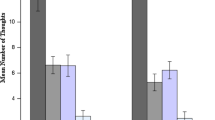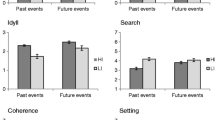Abstract
The ability to remember past events and imagine future events (episodic future thinking—EFT) has been shown to decline with aging. However, only few studies have analyzed the cognitive mechanisms involved in EFT in both young and older adults. The present study examined the role of working memory and inhibition on age-related differences between young and older adults in EFT, in response to short sentences reflecting common events, some of which were repeated in both conditions (past and future). Thirty-seven young and 36 older adults completed an adapted version of the autobiographical interview, in which sentences were presented. Results showed that processing resources explained a significant part of the variance in the amount of details; in particular, inhibition explained the amount of external details produced in the future condition. In addition, using sentences, the older group did not differ from the young adults in terms of the proportion of internal details recalled in the past condition, whereas they produced a lower proportion of internal details in the future condition. The effect of using structured material was reinforced by repeating some sentences in the past. Further, only older adults rated the remembered episodes as more emotionally salient and relevant than the imagined ones. Age-related differences between young and older adults in EFT appear to depend on the type of material used, on basic mechanisms of cognition, and are characterized by both quantitative and qualitative differences.
Similar content being viewed by others
Notes
The events were considered to be very common by three independent judges.
Although all participants were asked to indicate the period in their life when the event occurred or was expected to occur, data recording was available for a limited number of participants (30 young adults; 13 older adults). The tendency emerging from available data was explored with a 2 (young vs. old) by 2 (past vs. future) ANOVA on the number of years reported for past events and future events. Results showed a significant Age x Condition interaction, F(1,41) = 7.44, p < 0.01 η 2 p = 0.15: older adults (M 14.71, SD 8.42) rated their past events as having occurred a longer time before than young adults (M 6.38, SD 3.21). Moreover, only older adults reported events in the past as being more remote from the present than was the case for events imagined in the future (p = 0.004). No age-related differences were found for the future condition (young adults: M 6.84, SD 7.23; older adults: M 6.26, SD 8.28). Age-related differences in the time elapsing between the event and the present were only seen for past events.
References
Kray J, Lindenberger U (2000) Adult age differences in task switching. Psychol Aging 15(1):126–147
Craik FIM, Bialystok E (eds) (2006) Lifespan cognition: Mechanisms of change. Oxford University Press, Oxford, pp 297–314
Salthouse TA (1990) Working memory as a processing resource in cognitive aging. Dev Rev 10(1):101–124
Daigneault S, Braun CM (1993) Working memory and the self-ordered pointing task: further evidence of early prefrontal decline in normal aging. J Clin Exp Neuropsyc 15(6):881
Park DC, Lautenschlager G, Hedden T et al (2002) Models of visuospatial and verbal memory across the adult life span. Psychol Aging 17:299–320
Bopp KL, Verhaeghen P (2005) Aging and verbal memory span: a meta-analysis. J Gerontol B Psychol Sci Soc Sci 60:223–233
Hasher L, Zacks RT (1988) Working memory, comprehension, and aging: a review and a new view. Psychol Learn Motiv 22:193–225
Verhaeghen P, De Meersman L (1998) Aging and the stroop effect: a meta-analysis. Psychol Aging 13(1):120–126
Langenecker SA, Nielson KA, Rao SM (2004) fMRI of healthy older adults during stroop interference. Neuroimage 21(1):192–200
Hasher L, Lustig C, Zacks RT (2007) Inhibitory mechanisms and the control of attention. In: Conway A, Jarrold C, Kane M, Miyake A, Towse J (eds) Variation in working memory. Oxford University Press, New York, pp 227–249
Belanger S, Belleville S (2009) Semantic inhibition impairment in mild cognitive impairment: a distinctive feature of upcoming cognitive decline? Neuropsychology 23(5):592
Borella E, Delaloye C, Lecerf T et al (2009) Do age differences between young and older adults in inhibitory tasks depend on the degree of activation of information? Eur J Cogn Psychol 21(2):445–472
Harnishfeger KK, Bjorklund DF (1993) The ontogeny of inhibition mechanisms: A renewed approach to cognitive development. In: Howe ML, Pasnek R (eds) Emerging themes in cognitive development, vol 1. Springer-Verlag, New York
Borella E, Carretti B, De Beni R (2008) Working memory and inhibition across the adult life-span. Acta Psychol 128:33–44
Hamm VP, Hasher L (1992) Age and the availability of inferences. Psychol Aging 7:56–64
Craik FIM, Salthouse TA (eds) (2000) Handbook of aging and cognition, 2nd edn. Lawrence Erlbaum Associates, Hillsdale
Schacter DL, Addis DR (2007) The cognitive neuroscience of constructive memory: remembering the past and imagining the future. Philos T R Soc B 362:773–786
Addis DR, Pan L, Vu MA, Laiser N, Schacter DL (2009) Constructive episodic simulation of the future and the past: distinct subsystems of a core brain network mediate imagining and remembering. Neuropsychologia 47:222–238
Gamboz N, Brandimonte MA, De Vito S (2010) The role of past in the simulation of autobiographical future episodes. Exp Psychol 57:419–428
Gamboz N, De Vito S, Brandimonte MA et al (2010) Episodic future thinking in amnesic mild cognitive impairment. Neuropsychologia 48:2091–2107
Addis DR, Musicaro R, Pan L, Schacter DL (2010) Episodic simulation of past and future events in older adults: evidence from an experimental recombination task. Psychol Aging 25:369–376
Addis DR, Wong AT, Schacter DL (2008) Age-related changes in the episodic simulation of future events. Psychol Sci 19:33–41
Conway MA (2001) Sensory-perceptual episodic memory and its context: autobiographical memory. Philos T R Soc B 356:1375–1384
Rubin DC (2006) The basic-systems model of episodic memory. Perspect Psychol Sci 1:277–311
D’Argembeau A, Ortoleva C, Jumentier S et al (2010) Component processes underlying future thinking. Mem Cogn 38:809–819
Suddendorf T, Corballis MC (2007) The evolution of foresight: what is mental time travel, and is it unique to humans? Behav Brain Sci 30(3):299
Wechsler D (2000) Echelle d’intelligence pour adulte, 3rd edn. Editions du, Paris
Hill P, Emery LJ (2013) Episodic future thought: contributions from working memory. Conscious Cogn 22(3):677
Gaesser B, Sacchetti DC, Addis DR, Schacter DL (2011) Characterizing age-related changes in remembering the past and imagining the future. Psychol Aging 26:80–84
Squire L et al (2010) Role of the hippocampus in remembering the past and imagining the future. Proc Natl Acad Sci USA 107(44):19044
Zacks RT, Hasher L, Li KZH (2000) Human memory. In: Salthouse TA, Craik FIM (eds) Handbook of aging and cognition. Lawrence Erlbaum Associates, Mahwah
Levine B, Svoboda E, Hay JF et al (2002) Aging and autobiographical memory: dissociating episodic from semantic retrieval. Psychol Aging 17:677–689
Hurley N, Maguire EA, Vargha-Khadem F (2011) Patient HC with developmental amnesia can construct future scenarios. Neuropsychologia 49(13):3620
Race E, Keane MM, Verfaellie M (2011) Medial temporal lobe damage causes deficits in episodic memory and episodic future thinking not attributable to deficits in narrative construction. J Neurosci 31(28):10262–10269
Crook T, Bartus RT, Ferris SH et al (1986) Age associated memory impairment: proposed diagnostic criteria and measures of clinical change-report of a national institute of mental health work group. Dev Neuropsychol 2:261–276
Folstein MF, Folstein SE, McHugh PR (1975) “Mini-mental state”: a practical method for grading the cognitive state of patients for the clinician. J Psychiat Res 12:189–198
Wechsler D (1981) Wechsler adult intelligence scale-revised manual. The Psychological Corporation, New York
De Beni R, Marigo C, Nava LA et al (2008) BEN-SSC. Ben-essere e invecchiamento, in De Beni, Borella, Carretti, Marigo e Nava, pp. 97–114
Orsini A, Laicardi C (2003) Wais-R e terza età. La natura dell’intelligenza nell’anziano: continuità e discontinuità. [WAIS-R and the third age. The nature of intelligence in elderly people: continuity and discontinuity]. Firenze, Giunti OS
De Beni R, Borella E, Carretti B, et al (2008) BAC. Portfolio per la valutazione del benessere e delle abilità cognitive nell’età adulta e avanzata [The assessment of well-being and cognitive abilities in adulthood and aging]. Firenze, Giunti OS
D’Argembeau A, Van der Linden M (2004) Phenomenal characteristics associated with projecting oneself back into the past and forward into the future: influence of valence and temporal distance. Conscious Cogn 13:844–858
Daneman M, Carpenter PA (1980) Individual differences in working memory and reading. J Verb Learn Verb Be 19:450–466
De Beni R, Palladino P, Pazzaglia F et al (1998) Increases in intrusion errors and working memory deficit of poor comprehenders. Q J Exp Psychol A 51:305–320
Cohen J (1988) Statistical power analysis for the behavioral sciences. Lawrence Erlbaum, Hillsdale
Borella E, Ghisletta P, de Ribaupierre A (2011) Age differences in text processing: the role of working memory, inhibition and processing speed. J Gerontol B Psychol Sci Soc Sci 66:311–320
De Beni R, Palladino P (2004) Decline in working memory updating through ageing: intrusion error analyses. Memory 12:7589
Craik FIM, Byrd M (1982) Aging and cognitive deficits: the role of attentional resources. In: Craik FIM, Trehub S (eds) Aging and cognitive processes. Plenum, New York, pp 191–211
Carstensen LL (2006) The influence of a sense of time on human development. Science 312:1913–1915
Mammarella N, Borella E, Carretti B et al (2013) Assessing affective working memory: evidence from age-related differences. Neuropsychol Rehabil 23(3):1–13
Mikels JA, Larkin GR, Reuter-Lorenz PA et al (2005) Divergent trajectories in the aging mind: changes in working memory for affective vs. visual information with age. Psychol Aging 20:542–553
Dolcos F, LaBar KS, Cabeza R (2004) Dissociable effects of arousal and valence on prefrontal activity indexing emotional evaluation and subsequent memory: an event-related fMRI study. Neuroimage 23:64–74
D’Argembeau A, Van der Linden M (2006) Individual differences in the phenomenology of mental time travel: the effect of vivid visual imagery and emotion regulation strategies. Conscious Cogn 15:342–350
Gamboz N, De Vito S, Brandimonte MA et al (2010) Episodic future thinking in amnesic mild cognitive impairment. Neuropsychologia 48(7):2091–2097
Austin JT, Vancouver JB (1996) Goal constructs in psychology: structure, process, and content. Psychol Bull 120:338–375
D’Argembeau A, Mathy A (2011) Tracking the construction of episodic future thoughts. J Exp Psychol 140:258–271
Szpunar KK (2010) Episodic future thought: an emerging concept. Perspect Psychol Sci 5:142–162
Acknowledgments
The authors wish to thank Irene Grasso for helping in data processing. This work was supported by a grant from the Italian Ministry of Research and Education (Progetto PRIN: 2010P8LRP7_003).
Conflict of interest
None.
Human and Animal Rights
The study was conducted according to standards derived from the Declaration of Helsinki.
Informed consent
A written informed consent was obtained from every patient.
Author information
Authors and Affiliations
Corresponding authors
Rights and permissions
About this article
Cite this article
Zavagnin, M., De Beni, R., Borella, E. et al. Episodic future thinking: the role of working memory and inhibition on age-related differences. Aging Clin Exp Res 28, 109–119 (2016). https://doi.org/10.1007/s40520-015-0368-6
Received:
Accepted:
Published:
Issue Date:
DOI: https://doi.org/10.1007/s40520-015-0368-6




